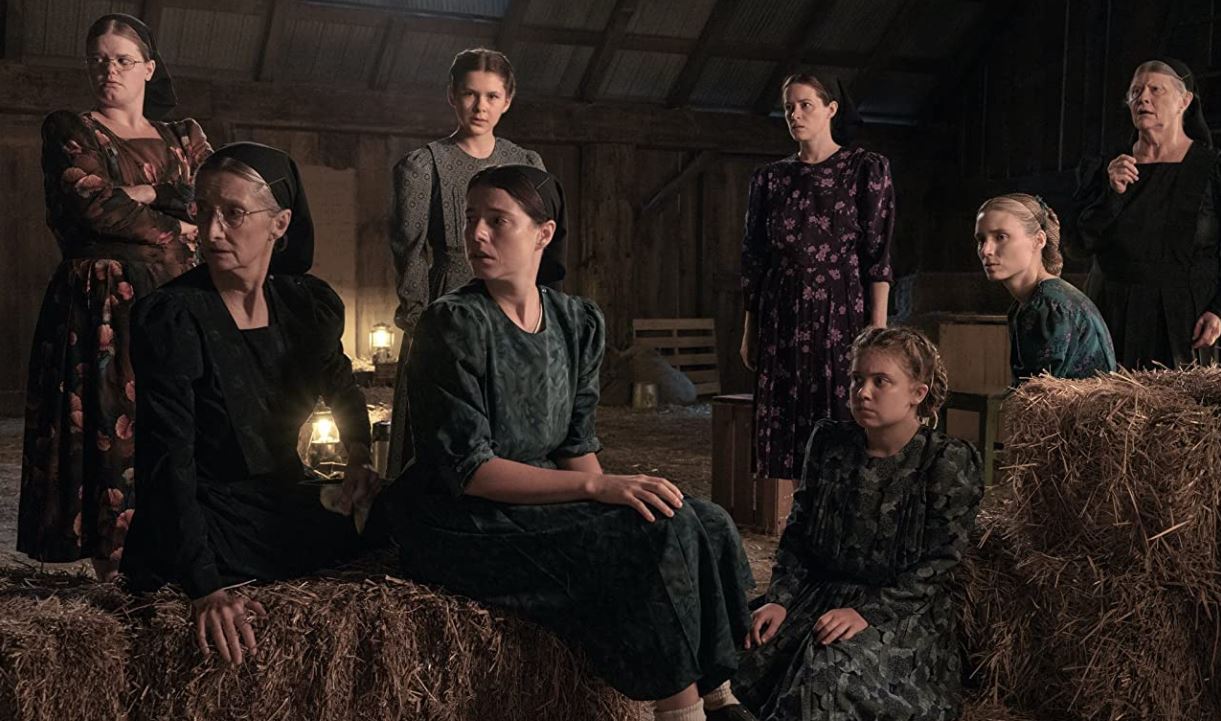| Worth seeing: | for strong performances and a powerful script that intellectualises the fight against the patriarchy within a segregated, ultra-religious community |

| Director: | Sarah Polley |
| Featuring: | Claire Foy, Jessie Buckley, Judith Ivey, Rooney Mara, Sheila McCarthy, August Winter, Ben Whishaw, Emily Mitchell, Frances McDormand, Kate Hallett, Kira Guloien, Liv McNeil, Michelle McLeod, Shayla Brown |
| Length: | 104 minutes |
| Certificate: | 15 |
| Country: | US |
| Released: | 10th February 2023 |
WHAT’S IT ABOUT?
In a devout, Mennonite community, the women have long suffered abuse from the men. But the latest attack by a group of men has pushed the women to the edge.
The perpetrators have been arrested and the menfolk have travelled to the local town to bail them out.
While the men are away, the women vote to decide whether to do nothing – as usual, stay and fight or leave. Doing nothing is immediately rejected so representatives of the leading families sit down to talk about which of the remaining options to take.
With the one man they trust, schoolteacher August (Ben Whishaw), taking minutes, arguments for and against staying to fight and leaving are put forward and knocked down.
Time is ticking until the men return, so community elders (Judith Ivey and Sheila McCarthy) and the most vocal among the next generation (Rooney Mara, Claire Foy and Jessie Buckley) don’t have long to reach a decision that will change their lives – and their community – forever.
WHAT’S IT LIKE?
Women Talking is the title. It could also be the review. That’s literally what this film is. Women talking.
So whether it works as a film is whether what the women are saying is worth listening to – and whether they make it compelling to listen to. On both counts, the answer is yes.
These women – coming from a background of unquestioning faith – have started to question not their faith but their own menfolk. And they’ve started to question what is more important to them – their traditions or their future.
While the women begin in defined groups – those who want to stay and fight for justice and those who believe starting afresh without the men is the only option – but as they rehearse the arguments, their views become more nuanced.
When the conversation requires clarity, they turn to August for guidance – the irony being that the whole point of the women talking is to take back power over their own lives from the men. They find themselves in a complex situation and there is a big decision to be made.
The writing is powerful – the arguments eloquent – perhaps too eloquent for the half of the population denied an education. The performances are similarly powerful and the ebb and flow of the conversation is always convincing.
But some of the arguments raised and conclusions reached are somewhat less so. Fundamental considerations aren’t really properly addressed, such as if they leave, where would they go or what would they do when the men find them?
It becomes more of a thought-provoking intellectual exercise than a truly realistic piece of drama, because the emotions run high on both sides of the argument and ultimately have little sway one way or the other.
Being set in a religious community, it’s interesting to hear them couch their arguments about their treatment and the prospects for the future against the biblical texts that they know off by heart but can’t read – it’s notable that no-one really believes that their god will save them, yet while there are arguments in favour of leaving their homes, no-one considers leaving their religion behind. It’s also notable how the generation gap plays into the conversation – with the hope of the younger women coming up against the experience of their elders.
Actress turned writer-director Sarah Polley has taken Miriam Toews’ novel, tweaked its narrative perspective and used cinematic tools to lift it off the screen.
It’s perhaps surprising that this feels like it could be set any time since the 1700s, until you get the odd flash of a fridge, a distant car or a spot of music over a loudspeaker – making the fundamental theme of an uprising against the patriarchy feel all the more relevant to today.
